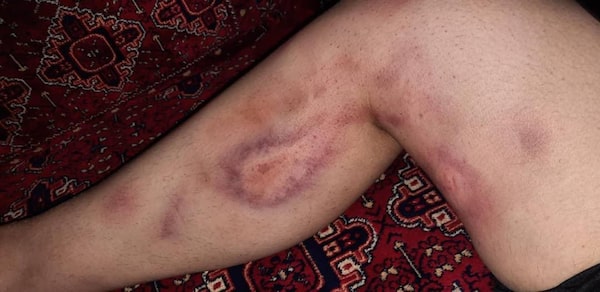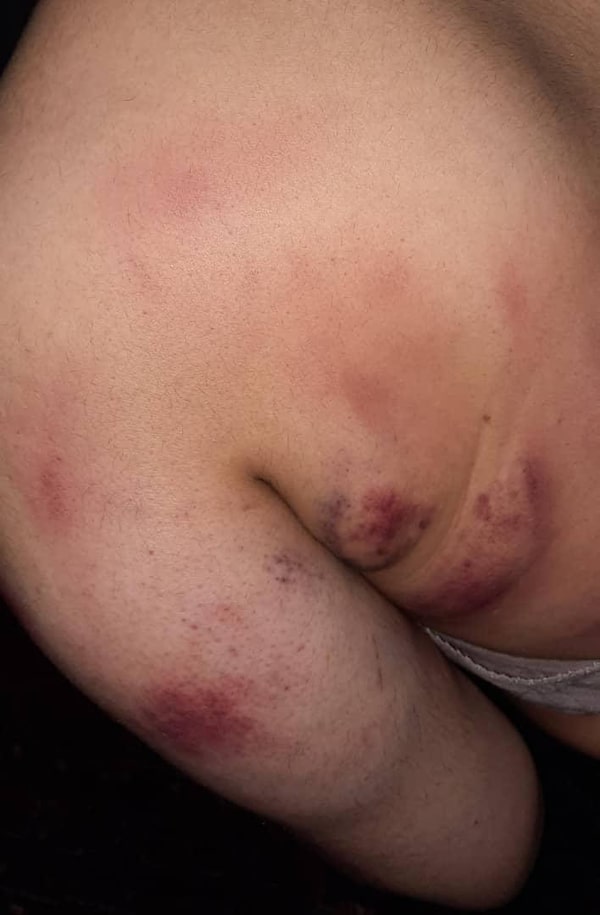
Arzoo, 24 – whose injuries are pictured here – and her 19-year-old niece were among the first targets of the crackdown.Handout
An alarming trend is emerging across Afghanistan, with a growing number of women being arrested, detained and tortured over purported violations of Taliban-mandated hijab regulations.
The crackdown against wearing “bad hijab” began in late December and marks the first major dress-code enforcement since the Taliban’s return to power in 2021. This has intensified concerns over the human rights of women in Afghanistan, who also face restrictions on their education, right to work and freedom of movement.
Some of the detained women spoke to The Globe and Mail in the hope of garnering international attention for the widespread mistreatment. The Globe is identifying the sources by their first names only because of concerns they may face retribution for speaking out.
Arzoo, 24 and her 19-year-old niece were among the first targets of the “bad hijab” crackdown. They went shopping for groceries at a market in the northeastern Takhar province at the end of December. Moments after they arrived, Arzoo said Taliban police officers stopped them and cursed at them for allegedly violating hijab rules. She argued that their clothes followed Islamic rules since both were wearing hijabs and medical face masks.
Despite Arzoo’s pleas, she said the pair were arrested, severely beaten and detained for two days before they were released and handed back to their families.
“They brutally beat us with fists, guns and kicks,” Arzoo said.
“They started beating us without any investigation or questions,” she said. “Currently, there is no law in Afghanistan, only the law of the jungle.”
Photos, videos and medical documents that Arzoo provided to The Globe show evidence of the injuries she said were sustained during her arrest and detainment.
They show Arzoo’s broken and bloody front teeth, which she says was a result of the Taliban police hitting her in the face with the butt of their guns. Medical records confirm that Arzoo underwent the extraction of multiple teeth. Additionally, her body is visibly covered in extensive bruising.
“Ever since I was beaten, I have been bleeding, which has worried me a lot,” she said.
Arzoo said multiple Taliban officers beat her and laughed at her during her detainment.
When the Taliban insist on Islam, “What rule allows them to touch my body? Whip me and tighten handcuffs on my hands?” Arzoo said.
“I have suffered psychologically after this incident, and I no longer see hope to live and be in Afghanistan,” she said. “If the international community pays attention to Afghan women, maybe we can achieve our dreams.”
Arzoo’s ordeal reflects a growing and worrying pattern that prompted the United Nations Assistance Mission in Afghanistan (UNAMA) to express “deep concern” in a Jan. 11 press release about the arrests and detentions of women and girls by Taliban authorities for their alleged failure to adhere to the hijab mandate.
In May, 2022, the Taliban’s Ministry for the Propagation of Virtue and Prevention of Vice issued a decree calling for women to wear head-to-toe clothing in public.
Since seizing power in 2021, the Taliban have imposed increasingly repressive measures against women, including banning them from attending secondary school and university, barring them from employment and preventing them from travelling more than 70 kilometres without a close male relative.
Zabihullah Mujahid, Taliban chief spokesman, deemed the UNAMA findings “incorrect” and labelled the statement “propaganda” in a post on X, formerly known as Twitter.
“Afghan women wear hijab on their own. Neither they have been forced to do so, nor the ministry of vice and virtue mistreated them,” he wrote.
In a report released Jan. 22, the UNAMA also warned that women belonging to Afghanistan’s ethnic groups were being unfairly targeted. Additionally, it noted that Taliban authorities have arrested women and girls predominantly in West Kabul, a Hazara-dominated area, and in Khair Khana, populated by people of Tajik ethnicity and communities from Panjshir.
“UNAMA is looking into allegations of instances of ill-treatment, longer periods of detention, incommunicado detention and demands for payment of money in exchange for release,” the report reads.
Richard Bennett, the Special Rapporteur on Afghanistan for the UN Human Rights Office, said in an interview with The Globe that reports of dress-code arrests started to come in around the beginning of January.
“There have been reports of the women being ill-treated in detention, but reportedly the women are pressured not to talk,” he said.
Mr. Bennett added that the Taliban “are not following their own rules imposed in May, 2022, but seemingly implemented only recently, where ‘bad hijab’ would result in warnings and other steps for male ‘guardians.’”
He also pointed out that the Taliban’s alleged actions during arrests contradict their rules since, culturally, it is deemed inappropriate for them to touch women.
Mr. Bennett said the UNAMA report corresponds with his findings, which he obtained independently.
“One point to note is that I said the Taliban are not following their own rules and UNAMA observes this as well. They say, ‘The measures taken by the de facto authorities contradict the hijab decree.’”
Reports of women being arrested for allegedly violating hijab rules have emerged from various parts of Afghanistan.

Arzoo said multiple Taliban officers beat her and laughed at her during her detainment.Handout
The story of Madina, 24, a resident of Kabul, is similar to that of Arzoo and her niece.
On Jan. 2, Madina was out shopping with her 19-year-old sister at a local mall when she said Taliban police arrested the pair along with several other women for allegedly violating hijab rules. She said they were detained for a day before being released and handed back to their families.
“My sister, myself and the other girls arrested were properly wearing the hijab,” Madina said in a recent interview.
“There was no problem with our hijab,” she said. The Taliban arrested them just to scare them, she added, “so women never leave the house due to fear.”
A video obtained by The Globe depicts Madina and about five other women inside a Taliban vehicle directly following their arrest. The young women in the car are crying and wearing hijabs.
“When we arrived at the Taliban headquarters, one of the Taliban pointed to a toilet and said, ‘We will put you inside that toilet,’” Madina said. “When we refused to go inside the toilet, they just put us inside a yard full of garbage.”
Madina said Taliban authorities threatened to kill the arrested women if they were ever caught not wearing a “Talibani hijab.”
Madina expressed fear for her safety and that of her family.
“I am afraid of what will happen to me and my family if the Taliban find out that I was interviewed,” she said.
Mr. Bennett said the Taliban arrests appear to be part of a tactic to control women through fear.
“This is a way to scare women to keep them at home. It works. They’re so frightened that they will be arrested,” he said. “In addition to potential ill treatment, they are likely to be stigmatized and experience mental-health problems after their release.”
Mr. Bennett emphasized Afghanistan’s continuing obligation to adhere to international human-rights treaties that it has ratified, stressing that shifts in government do not release the state from these commitments.
“There are certain things that the Taliban de facto authorities appear to want. One of those is to be legitimized,” he said.
“If Afghanistan wants to be readmitted as a regular member of the international community, which it is not right now, under the Taliban control, then it needs to meet its international human-rights obligations, starting with its obligations toward women. Unless that is done, I don’t think there will be movement toward integration.”
He stated that a country could potentially take Afghanistan to the International Court of Justice for violating international treaties, specifically the Convention on the Elimination of All Forms of Discrimination against Women.
“If we do not raise our voice against this situation, we will be buried alive one day,” Madina said. “The world needs to hear the voices of Afghan women.”
She said she is asking the international community to help the Afghan people and put pressure on the Taliban to remove restrictions placed on women.
“Our life has turned into darkness since the time of the Taliban rule,” Madina said. “We are alive, but we are not living.”